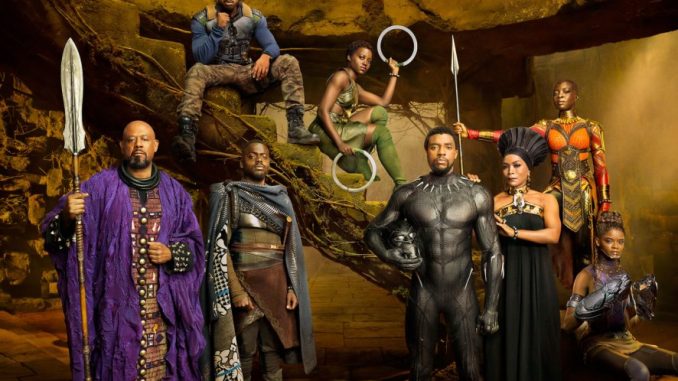
Unless you are living under a rock, you have probably heard about the upcoming release of the Marvel Comic, Black Panther. You may have also heard that the film broke a historic record this week: in under 24 hours, it sold more pre-sale tickets than any Marvel movie, ever.
A lot of the excitement for the movie stems from the stellar cast that director and writer, Ryan Coogler, who also wrote and directed critically acclaimed movies, Fruitvale Station (2013) and Creed (2015), has brought together. Big name African American and African actors such as Chadwick Bosema, Lupita Nyong’o, Danai Gurira, Daniel Kuluuya, and Forest Whitaker, are set to star in the film, alongside an equally diverse supporting cast. As the film’s executive producer, Nate Moore, asserted in an interview with Empire magazine, “T’Challa isn’t just the first black superhero to headline a Marvel film, he’s the first African superhero.”
But not only is the movie shock full of black actors and actresses, its fictional story is deeply and intentionally African. The movie deals with issues that are especially relevant and timely for the African continent, a fact that must be acknowledged in today’s complex and rapidly changing Africa narrative. As such, it is not enough that we acknowledge that the film has a good cast and equally good music as produced by American rapper Kendrick Lamar, it is imperative that we contextualize the importance of its setting in our current socio-political context.
The series, set in the fictional country of Wakanda, a small isolated Afro-futuristic kingdom in East Africa is perhaps a chilling reminder of a real African country, the Democratic Republic of Congo.
The reclusive Wakanda is shielded by both natural barriers like mountains and a font that it produces “third world” textiles that masks its truly advanced technological society. Wakanda was never conquered, colonized, or disturbed – or disturbed anyone. Furthermore, it is the only country with vibranium mines in the world, vibranium being the rarest and force rendering metal that allows Wakanda to develop technology that the rest of the world can not even dream of. The story then, of the Black Panther, T’Challa’s, is that of a coming of age story to defend the country against both internal and external forces and maintain his father, King T’Chaka’s, legacy.
Like Wakanda, the DRC has a mineral that holds the key to the future, especially for a world that is increasingly and perhaps invariably dependent on technology.
According to a National Geographic report in 2013, Congo’s mines produce nearly half of the world’s supply of tantalum, [as well as a large percentage of its tin ore, tungsten, gold, and dozens of other minerals used in electronics]. Tantalum is the rare, blue-grey metal that conducts electricity through the smart devices we are all addicted to. Thanks to skyrocketing demand from electronics makers, tantalum—along with a handful of other rare minerals—is an incredibly sought-after metal. The same for cobalt, a component in the lithium-ion batteries used to power electric cars and mobile phones, for which the DRC produces about two-thirds of global output.
But, rather than yield the tremendous power that Wakanda commands in the world, all indicators suggest that the DRC is the poorest country in the world. The presence of the country’s tremendous natural resources is fueling violence, hunger, and disease, rather than aiding in its supreme reign over the world.
And for many reasons: unlike Wakanda, the DRC is the second largest country in Africa by size and the fourth by population. It has one of the most gruesome and brutal tales of colonization the world has ever seen – ever heard of King Leopold, the “Hitler” of Africa? The country is consistently full of multinationals who continue to scramble for the country’s wealth and has been in the international media for decades over the issue of conflict minerals.
In fact, at a time when Africa continues to dominate the international news in equally terrifying and fantastic ways – from the Libyan slave trade outrage to the peaceful ousting of one of Africa’s oldest dictator, Robert Mugabe both in 2017 – Coogler and executive producer Nate Moore’s intentional portrayal of a morally astute African superhero, T’Challa, and a superiority advanced fictional African country by the name of Wakanda, is powerful.
We must remember that it is powerful because it allows for a critical juxtaposition and questioning of the real world realities of African lives. Questions such as, what would the DRC be had it enjoyed Wakanda’s development trajectory – absent colonization, imperialism, violence and war? More importantly, what can Wakanda inspire in the fight to fully liberate all Africans, especially our brothers from the DRC, from economic and socio-political struggle? Who is the T’Challa of the DRC we need to praise?
BY BRIDGET BOAKYE
